Heading Example
Programme Description & Aims
The Ph.D is a research degree, examined, usually after four years of research, by a dissertation of up to 100,000 words. The criteria for obtaining the degree are that the dissertation shall represent a 'substantial contribution to knowledge', and represent a realistic amount of work for the duration of the study.
Doctoral candidates have opportunities to attend various reading groups, papers by visiting speakers, seminars and conferences organized by the Department, School and University. They can also organize their own reading groups, ‘work-in-progress’ seminars and conferences.
Programme length
4 years full time.
Programme Content
Contemporary Drama (2 credits)
The course examines the main features of modern drama from the late nineteenth century to the present day. Through readings, videos, and interactive internet projects, students will examine the richness and diversity of contemporary theatre and drama from a global context. Significant aspects of modern drama are considered in class through examples on performed plays, examination of critical reviews, and analysis of additional texts where appropriate.
Philosophy of Literature (2 credits)
The design of the Philosophy of Literature is guided by the idea that philosophical reflection is indispensable for an in-depth understanding of issues raised by the literary as such – questions concerning interpretation, knowledge, authorship, fictionality, imagination, and narrative, among others. The course also involves inquiry into the specific concerns found within individual literary works; for example questions about selfhood and identity, the place of the aesthetic in modernity, love and the projection of value, nonsense and linguistic norms, the conditions for ethical life, and the political relevance of artistic form. At the same time the course explores ways in which literature is not merely an object of theoretical, including philosophical, study but has the potential to de-stabilize and call into question familiar modes and paradigms of philosophical thinking.
The course is thus genuinely interdisciplinary and this is reflected in the nature of its core components, drawing on expertise from the Departments of Philosophy, English and Comparative Literature.
Literary Theory (2 credits: Optional)
The course is structured around the following objectives:
1) to explore the major current issues in critical theory beyond the mechanical application of strict approaches within theoretical frameworks
2) to practice reading literary and non-literary texts “along with” these issues in a way that theory and practice do not act as exclusive binaries but rather as interactive and reciprocal entities.
Advanced Research (2 credits)
This course is designed to help guide postgraduate students in how to think about and do research. Students will learn about how to collect and analyze different types of data. They will become familiar with some of the critiques of various research methods. These critiques may be methodologically based but they may also draw from epistemological questions that surround the topic in question. The course will also focus on the theory, logic, and practice of fieldwork, specific methodological and ethical issues associated with studying theories, texts and inter-
texts.
Contemporary Poetry (2 credits)
The course aims to get seriously involved in the poetry and poetics of today; an effort is made to present an inclusive view of various tastes and types of poetry; students are expected to do their very best and actively rise to the challenges contemporary poetry offers.
World Masterpieces (2 credits: Optional)
This course allows the students to study various masterpieces of the ancient world, the medieval period, and the renaissance.
Literature in the Victorian Era (2 credits)
The course covers British literature and culture during Queen Victoria’s long reign, 1837-1901. This was the brilliant age of Charles Dickens, the Brontës, Graham R. Tomson, Lewis Carroll, George Eliot, Robert Browning, Oscar Wilde, Arthur Conan Doyle, Rudyard Kipling, Alfred, Lord Tennyson - and many others. It was also the age of urbanization, steam power, class conflict, Darwin, religious crisis, imperial expansion, information explosion, bureaucratization - and much more.
Shakespeare Studies (2 credits)
This course will treat Shakespeare’s poems, history plays, comedies, and tragedies as thought experiments, as agnostic investigations into language use, governance, sexuality, ethics, and mortality. The plays and poems will be approached as dramatic essays that probe what early modern people—and we—take for granted or find obscure. Lectures will model interpretive options and procedures and students in turn will interpret Shakespearean language that speaks clearly for itself. Students will demonstrate proficiency in interpreting Shakespearean texts and in composing persuasive arguments in discussion sections and written papers.
The Contemporary Novel
This course allows students to study a wide range of works from 1945 to the present. The course traces the formal and thematic developments of the novel in this period, focusing on the relationship between writers and readers, the conditions of publishing, innovations in the novel's form, fiction's engagement with history, and the changing place of literature in within a global culture.
Thesis/Dissertation (18 credits)
The programme ends with students writing up a dissertation to obtain the PhD in English literature. Students typically have two years to complete the dissertation and have a supervisory committee, comprised of one supervisor and two co-supervisors, to offer academic advice and support.

